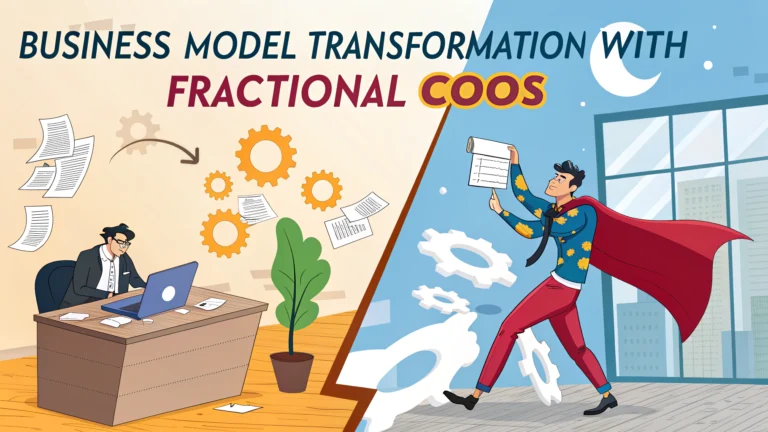Business model transformation requires strategic leadership and operational expertise that many companies can’t afford to maintain full-time.
A fractional COO provides the perfect solution by offering high-level operational guidance without the overhead of a full-time executive.
This quick guide explores how fractional COOs help businesses evolve their operating models while optimizing costs and maintaining strategic flexibility.
What is a Fractional COO?
A fractional COO is an experienced operations executive who works part-time with multiple companies, typically spending 10-20 hours per week with each client.
Key Benefits of Using a Fractional COO for Business Transformation
- Cost-effective access to senior operational expertise
- Objective third-party perspective on business processes
- Flexible engagement terms based on project needs
- Rapid implementation of proven operational strategies
- Cross-industry insights and best practices
Common Business Model Transformation Areas
- Digital transformation initiatives
- Process automation and optimization
- Supply chain restructuring
- Customer experience enhancement
- Revenue model optimization
- Organizational restructuring
How to Select the Right Fractional COO
- Review industry experience and past transformation projects
- Check references and case studies
- Assess cultural fit and communication style
- Evaluate availability and commitment level
- Confirm alignment on transformation goals
Implementation Timeline
| Phase | Duration | Key Activities |
|---|---|---|
| Assessment | 2-4 weeks | Business analysis, goal setting, stakeholder interviews |
| Planning | 3-6 weeks | Strategy development, resource allocation, timeline creation |
| Execution | 3-12 months | Implementation, monitoring, adjustments |
Cost Considerations
- Hourly rates: $150-500 depending on experience
- Project-based fees: $5,000-25,000 per month
- Success fees: Optional performance-based compensation
Measuring Transformation Success
Track these key performance indicators (KPIs) to measure the impact of your business model transformation:
- Revenue growth rate
- Operational efficiency metrics
- Customer satisfaction scores
- Employee productivity measures
- Cost reduction achievements
Resources and Next Steps
Connect with qualified fractional COOs through these platforms:
- LinkedIn – Professional network for executive talent
- Upwork – Freelance marketplace with executive consultants
- CEOxChange – Executive networking platform
Contact industry associations and professional networks in your area for referrals to experienced fractional COOs.
Managing the Transformation Process
Successful business model transformation requires careful change management and stakeholder engagement. Fractional COOs typically follow these proven steps:
- Establish clear communication channels and reporting structures
- Create detailed project milestones and accountability measures
- Develop contingency plans for potential roadblocks
- Build cross-functional teams to support implementation
- Monitor progress and adjust strategies as needed
Risk Mitigation Strategies
Common Transformation Risks
- Employee resistance to change
- Technology integration challenges
- Budget overruns
- Timeline delays
- Stakeholder misalignment
Mitigation Approaches
- Regular stakeholder updates and feedback sessions
- Phased implementation to minimize disruption
- Comprehensive training and support programs
- Clear documentation of processes and decisions
- Regular risk assessment and response planning
Maximizing Long-Term Value
To ensure sustainable transformation success, focus on these key areas:
- Knowledge transfer to internal teams
- Documentation of new processes and procedures
- Establishment of continuous improvement protocols
- Development of internal transformation champions
- Creation of sustainable governance structures
Taking Your Business to the Next Level
Engaging a fractional COO for business model transformation provides a strategic advantage in today’s competitive landscape. With their expertise, companies can achieve significant operational improvements while maintaining financial flexibility and accessing best-in-class practices.
Start by assessing your transformation needs and engaging with qualified fractional COOs to develop a customized approach for your organization’s evolution.
FAQs
- What is a Fractional COO, and how does it differ from a full-time COO?
A Fractional COO is a part-time Chief Operating Officer who works with multiple companies, offering strategic operational leadership on a flexible basis. Unlike a full-time COO, they work limited hours and can be more cost-effective for businesses that need executive expertise but can’t justify a full-time position. - How can a Fractional COO help transform my business model?
A Fractional COO can analyze current operations, identify inefficiencies, implement new processes, optimize resource allocation, and lead digital transformation initiatives while providing strategic guidance for sustainable growth and scalability. - What are the typical costs associated with hiring a Fractional COO?
Fractional COO costs typically range from $1,500 to $5,000 per month, depending on time commitment, scope of work, and expertise level. This represents significant savings compared to full-time COO salaries, which can exceed $200,000 annually. - How much time does a Fractional COO typically spend with each business?
Fractional COOs usually dedicate 8-40 hours per month to each client, depending on the business’s needs and agreed-upon arrangement. Time allocation can be adjusted based on project phases and organizational requirements. - What industries can benefit most from a Fractional COO?
Small to medium-sized businesses, startups, scale-ups, and companies in transition phases across various industries can benefit, particularly those in technology, manufacturing, professional services, and retail sectors seeking operational excellence. - What key performance indicators (KPIs) should I expect a Fractional COO to impact?
A Fractional COO typically impacts operational efficiency metrics, profit margins, employee productivity, process optimization, customer satisfaction scores, and overall business scalability indicators. - How long should I expect to work with a Fractional COO?
Typical engagements range from 6 months to 2 years, depending on the scope of transformation needed. Some businesses maintain ongoing relationships for continued strategic support and operational oversight. - What qualifications should I look for when hiring a Fractional COO?
Look for candidates with proven executive leadership experience, demonstrated success in business transformation, relevant industry expertise, strong project management skills, and a track record of implementing operational improvements in similar-sized organizations. - Can a Fractional COO help with digital transformation initiatives?
Yes, many Fractional COOs specialize in digital transformation, helping businesses select and implement new technologies, streamline digital processes, and integrate digital solutions into existing operations. - How do I measure the ROI of hiring a Fractional COO?
ROI can be measured through improved operational efficiency, reduced costs, increased revenue, enhanced productivity metrics, successful project implementations, and achieved business transformation milestones.







